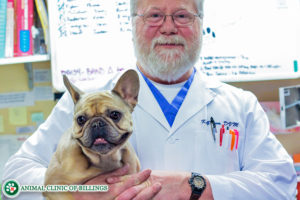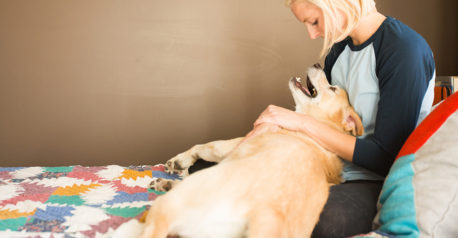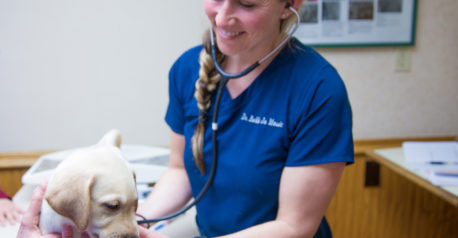Shoulder Instability in Dogs
What is shoulder instability?
Shoulder instability in dogs occurs when the normally snug-fitting ball-and-socket shoulder joint becomes loose enough to allow abnormal movement within the joint, causing pain, inflammation, and significant arthritic changes over time. Instability may be caused either by genetic factors, usually in small breed dogs such as Dachshunds, Chihuahuas, Toy Poodles, and Shetland Sheepdogs, or by traumatic injuries, the typical cause in affected medium and large breed dogs. Injury to any of the soft tissues that surround and stabilize the joint—either from a sudden trauma or from overuse over an extended period—may result in shoulder instability.
Dogs with shoulder instability display varying degrees of lameness on the affected limb. This lameness usually gets worse with exercise.
How is shoulder instability diagnosed in dogs?
Diagnosis of shoulder instability is based upon a careful orthopedic examination of the limb that is usually performed under sedation or general anesthesia. X-rays are also taken at that time in order to evaluate for the presence of arthritis and other abnormalities. In some cases, a CT or MRI may be necessary to definitively identify the damaged structure(s).
Following the examination and imaging, arthroscopy of the shoulder joint may be recommended. In this procedure, a tiny camera is inserted into the shoulder joint to allow visual examination of the joint tissues, providing an optimum opportunity for your orthopedic surgeon to further evaluate any abnormalities.
How is it treated in dogs?
Treatment of shoulder instability depends on which structures are involved as well as the severity of the damage and consequent instability. Relatively mild instability may be treated non-surgically with anti-inflammatory medication, exercise modification, and physical rehabilitation therapy. Additionally, a customized hobble vest may be helpful for some types of low-to-mid grade injuries. This device, used for medial shoulder instability, prevents the forelimb from abducting (splaying outward) from its normal position during daily activities.
Surgical stabilization: Several surgical techniques exist to stabilize the shoulder joint. These procedures are appropriate for many dogs who have moderate to severe shoulder instability. Selection of the most appropriate technique depends on which structures have been damaged.
Shoulder fusion (arthrodesis): In animals with severe shoulder instability, chronic shoulder dislocation (luxation), and severe degenerative changes, fusing the shoulder joint may be the best option to maintain comfort and weight-bearing ability. This procedure is considered a last resort when other treatments have failed or have a low probability of success.
The use of professional physical rehabilitation therapy has proved to significantly improve patient recovery with shoulder instability, whether or not surgery is performed. As part of their treatment, a home-care physiotherapy plan will be designed specifically according to your dog’s needs by one of our canine physical rehabilitation practitioners at the Animal Clinic of Billings and Animal Surgery Clinic and outpatient physical rehabilitation therapy appointments for underwater treadmill exercise and laser therapy can be made through our rehabilitation service.
How will I know if my dog or cat has Medial Shoulder Instability (MSI)?
Dogs and cats with shoulder joint instability often present with a history of chronic lameness, which is often subtle and intermittent but can become severe and continuous. Physical signs of atrophy (decreased muscle mass) in the shoulder muscles of the affected limb, as well as pain with shoulder joint manipulation are common. Often only partial improvement is seen with the use of veterinary non-steroidal anti-inflammatory medications.

Let our highly trained and experienced team of veterinarians and veterinary technicians help you keep your dog as happy and healthy as they can be.
Call the Animal Clinic of Billings and Animal Surgery Clinic to schedule your pet dog’s next wellness examination with one of our veterinarians today!
406-252-9499 REQUEST AN APPOINTMENT



